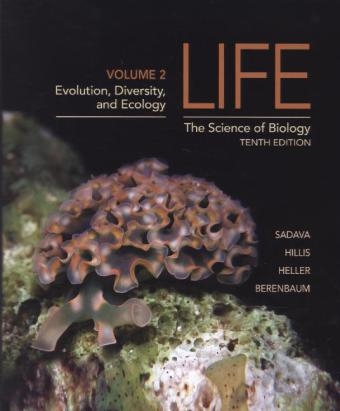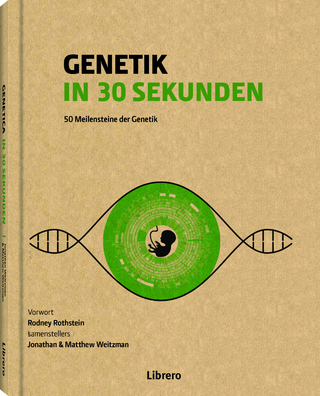
Life: The Science of Biology
W.H.Freeman & Co Ltd (Verlag)
978-1-4641-4123-2 (ISBN)
- Titel ist leider vergriffen;
keine Neuauflage - Artikel merken
David Sadava, Claremont Colleges, USA David is the Pritzker Family Foundation Professor of Biology, Emeritus, at the Keck Science Center of Claremont McKenna, Pitzer, and Scripps, three of The Claremont Colleges. In addition, he is Adjunct Professor of Cancer Cell Biology at the City of Hope Medical Center. Twice winner of the Huntoon Award for superior teaching, Dr. Sadava taught courses on introductory biology, biotechnology, biochemistry, cell biology, molecular biology, plant biology, and cancer biology. In addition to "Life", he is the author or coauthor of books on cell biology and on plants, genes, and crop biotechnology. His research has resulted in many papers co-authored with undergraduates, on topics ranging from plant biochemistry to pharmacology of narcotic analgesics to human genetic diseases. For the past 15 years, he has investigated multi-drug resistance in human small-cell lung carcinoma cells with a view to understanding and overcoming this clinical challenge. At the City of Hope, his current work focuses on new anti-cancer agents from plants and fungi. David Hillis, University of Texas, USA David is the Alfred W. Roark Centennial Professor in Integrative Biology and the Director of the Center for Computational Biology and Bioinformatics at the University of Texas at Austin, where he also has directed the School of Biological Sciences. Dr. Hillis has taught courses in introductory biology, genetics, evolution, systematics, and biodiversity. He has been elected into the membership of the National Academy of Sciences and the American Academy of Arts and Sciences, awarded a John D. and Catherine T. MacArthur Fellowship, and has served as President of the Society for the Study of Evolution and of the Society of Systematic Biologists. His research interests span much of evolutionary biology, including experimental studies of evolving viruses, empirical studies of natural molecular evolution, applications of phylogenetics, analyses of biodiversity, and evolutionary modeling. He is particularly interested in teaching and research about the practical applications of evolutionary biology. H. Craig Heller, Stanford University, USA Craig is the Lorry I. Lokey/Business Wire Professor in Biological Sciences and Human Biology at Stanford University. He earned his Ph.D. from the Department of Biology at Yale University in 1970. Dr. Heller has taught in the core biology courses at Stanford since 1972 and served as Director of the Program in Human Biology, Chairman of the Biological Sciences Department, and Associate Dean of Research. Dr. Heller is a fellow of the American Association for the Advancement of Science and a recipient of the Walter J. Gores Award for excellence in teaching. His research is on the neurobiology of sleep and circadian rhythms, mammalian hibernation, the regulation of body temperature, the physiology of human performance, and the neurobiology of learning. Dr. Heller has done research on a huge variety of animals and physiological problems ranging from sleeping kangaroo rats, diving seals, hibernating bears, photoperiodic hamsters, and exercising athletes. Some of his recent work on the effects of temperature on human performance is featured in the opener to Chapter 40. May Berenbaum, University of Illinois, USA May is the Swanlund Professor and Head of the Department of Entomology at the University of Illinois at Urbana-Champaign. She has taught courses in introductory animal biology, entomology, insect ecology, and chemical ecology and has received awards at the regional and national level for distinguished teaching from the Entomological Society of America. A fellow of the National Academy of Sciences, the American Academy of Arts and Sciences, and the American Philosophical Society, she served as President of the American Institute for Biological Sciences in 2009. Her research addresses insect-plant co-evolution from molecular mechanisms of detoxification to impacts of herbivory on community structure. Concerned with the practical application of ecological and evolutionary principles, she has examined impacts of genetic engineering, global climate change, and invasive species on natural and agricultural ecosystems. Devoted to fostering science literacy, she has published numerous articles and five books on insects for the general public.
Part VI: THE PATTERNS AND PROCESSES OF EVOLUTION Mechanisms of Evolution Reconstructing and Using Phylogenies Speciation Evolution of Genes and Genomes The History of Life on Earth Part VII: THE EVOLUTION OF DIVERSITY Bacteria, Archaea, and Viruses The Origin and Diversification of Eukaryotes Plants without Seeds: From Water to Land The Evolution of Seed Plants The Evolution and Diversity of Fungi Animal Origins and the Evolution of Body Plans Protostome Animals Deuterostome Animals Part X: ECOLOGY Ecology and the Distribution of Life Population Ecology Species Interaction and Coevolution Community Ecology Ecosystems and Global Ecology Biodiversity and Conservation Biology
| Zusatzinfo | Illustrations (chiefly col.) |
|---|---|
| Verlagsort | New York |
| Sprache | englisch |
| Maße | 217 x 276 mm |
| Gewicht | 1318 g |
| Einbandart | kartoniert |
| Themenwelt | Naturwissenschaften ► Biologie ► Genetik / Molekularbiologie |
| ISBN-10 | 1-4641-4123-1 / 1464141231 |
| ISBN-13 | 978-1-4641-4123-2 / 9781464141232 |
| Zustand | Neuware |
| Haben Sie eine Frage zum Produkt? |
aus dem Bereich


